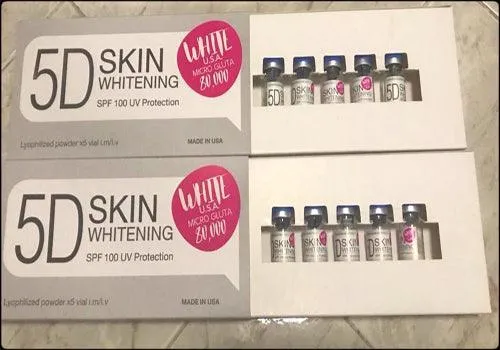Understanding Skin Whitening Injections
Skin whitening injections are a cosmetic procedure gaining popularity in Pakistan and other parts of the world. These injections aim to lighten the skin tone by reducing the production of melanin, the pigment responsible for skin color. While proponents claim these injections can result in a fairer complexion, it is crucial to understand the process, ingredients, potential risks, and, of course, the cost associated with these procedures. The demand for these injections has surged in recent years, making it essential to research and understand the financial aspects of the treatment. Before considering this path, one must assess the potential risks, benefits, and long-term effects on the skin and overall health.
Common Ingredients in Skin Whitening Injections
The efficacy of skin whitening injections largely depends on their ingredients. Various compounds are used to inhibit melanin production or accelerate skin cell turnover. The most common ingredients include glutathione and vitamin C, often combined with other substances to enhance the whitening effect. It is vital to be aware of the ingredients used in any treatment and consult with a dermatologist to understand their potential effects and safety. Many clinics will provide information about the ingredients used, however, it’s crucial to ensure they are of high quality and from a reputable source to minimize potential risks. Always inquire about the source and the concentration of each component used in the injections before committing to treatment.
Glutathione

Glutathione is a powerful antioxidant naturally produced by the liver. It is often the primary active ingredient in skin whitening injections. It works by inhibiting tyrosinase, an enzyme involved in melanin production. As a result, the skin becomes lighter and brighter. However, the effectiveness of glutathione for skin whitening is still debated. Studies show varying results, and the FDA has not approved it for this specific purpose. The concentration of glutathione used in injections and the frequency of treatments are factors that influence the overall cost. It’s also important to note that while generally considered safe, glutathione injections can cause side effects like skin rashes and allergic reactions in some individuals.
Vitamin C
Vitamin C, also known as ascorbic acid, is another common ingredient in skin whitening injections. It is an antioxidant that protects the skin from damage caused by free radicals and contributes to collagen production, promoting healthy skin. It also enhances the effects of glutathione and may help to lighten the skin tone. In addition to its antioxidant properties, vitamin C aids in melanin suppression, offering a dual benefit in skin whitening procedures. While vitamin C injections are generally well-tolerated, some individuals might experience mild side effects such as redness or soreness at the injection site. The presence of vitamin C in skin whitening treatments is often linked to a boost in overall skin health and radiance.
Other Potential Ingredients
Besides glutathione and vitamin C, some injections may include other ingredients like alpha-lipoic acid and kojic acid. Alpha-lipoic acid is another antioxidant that can enhance the effects of glutathione. Kojic acid is derived from fungi and helps to inhibit melanin production. These additional components may influence the overall cost and the potential results of the treatment. Before undergoing any procedure, it’s crucial to fully understand all the ingredients used in the injections and their intended effects on the skin. Always consult with a healthcare professional who can explain the role of each ingredient and any possible side effects or interactions.
Factors Influencing the Cost

The cost of skin whitening injections in Pakistan varies widely, depending on several factors. Understanding these influences is crucial for budgeting and making informed decisions about treatment. Clinic reputation, geographic location, the expertise of the medical professionals, and the specific ingredients used all contribute to the overall price. The price structure can be complex, and it’s essential to have a clear understanding before committing to the procedure. Comparing different clinics and thoroughly evaluating their offerings is advisable to ensure that you receive the best value for your money.
The Brand and Quality
The brand and quality of the injections significantly impact the cost. Reputable brands that use high-quality ingredients and follow stringent safety standards tend to be more expensive. These brands often invest in research and development, ensuring their products are effective and safe. Opting for well-known brands from trusted suppliers can provide peace of mind about the treatment’s efficacy and potential risks. Always inquire about the brand of injections used and verify the source of the products before starting any treatment. While cost is a consideration, quality should be a priority to minimize potential adverse effects and ensure the best possible outcomes.
Clinic Location
The location of the clinic also plays a role in determining the cost of skin whitening injections. Clinics in major cities or affluent areas usually charge more due to higher overhead costs and demand. Furthermore, clinics in well-established, reputable areas often have higher prices because they invest in advanced equipment and highly trained staff. Clinics in smaller towns or less populated areas might offer more competitive prices, but it is essential to consider other factors like the clinic’s reputation, the experience of the practitioners, and the quality of the services offered. Comparing prices from different locations is a crucial step in finding a suitable treatment that fits your budget and preferences.
Number of Sessions

The number of sessions required to achieve the desired results significantly impacts the overall cost. Skin whitening treatments typically involve multiple sessions spread over weeks or months, depending on the individual’s skin tone and the desired outcome. Each session adds to the total expense. The practitioner will determine the number of sessions based on a comprehensive assessment of your skin condition. Before committing to treatment, inquire about the expected number of sessions and their associated costs. Understanding the long-term financial commitment can prevent unexpected expenses and allow you to plan your budget effectively. It is worth asking if the clinic provides package deals for multiple sessions, which may reduce the overall price.
Dosage and Concentration
The dosage and concentration of the active ingredients in the injections can also affect the price. Higher concentrations of glutathione and vitamin C may be more expensive due to the cost of the raw materials and the expertise required in their administration. The practitioner will adjust the dosage based on the individual’s skin type, desired results, and overall health. It is essential to discuss the dosage and concentration with the practitioner beforehand to understand the potential impact on the cost and the expected results. Keep in mind that the most expensive option isn’t always the best, so consider the balance between cost, quality, and desired outcomes.
Average Cost of Skin Whitening Injections in Pakistan
The average cost of skin whitening injections in Pakistan can range significantly. Prices often vary based on the factors mentioned above, including clinic location, brand, and the expertise of the medical professionals. It’s difficult to provide an exact figure due to these variations. However, you can find cost ranges online from various clinics. The cost per session could range from a few thousand to tens of thousands of Pakistani rupees. For a complete treatment plan, which requires multiple sessions over several months, the total cost can be substantial. Always research and compare prices from different clinics to understand the average cost in your area. Be wary of prices that seem too low, as they could indicate lower-quality products or inexperienced practitioners.
Cost Comparison of Different Clinics

Comparing the cost of skin whitening injections from different clinics is essential to finding the best deal. Start by researching clinics in your area and gathering information about their services and pricing. Contact clinics to inquire about the cost per session, the ingredients used, and the number of sessions required. Review online reviews and testimonials from other patients to gauge the clinic’s reputation and quality of service. Consider all factors, including the brand of injections, the expertise of the practitioners, and the clinic’s location. While the price is an important factor, don’t let it be the sole determinant. Ensure that you choose a reputable clinic with a proven track record and a commitment to patient safety. Take the time to carefully evaluate and compare your options before making a decision.
Potential Risks and Side Effects
Before undergoing skin whitening injections, it is crucial to understand the potential risks and side effects. The FDA has not approved glutathione or other similar products for skin whitening. Some common side effects include injection site reactions, such as pain, redness, and swelling. In rare cases, more serious side effects like allergic reactions, infections, and skin disorders can occur. It is essential to discuss these risks with a healthcare professional before starting any treatment. Be sure to ask the practitioner about the side effects and what to do if you experience any adverse reactions. It is always best to have a thorough understanding of the risks and potential complications before proceeding with the procedure.
Skin Whitening Injections Safety Concerns
Safety should be the top priority when considering skin whitening injections. Several safety concerns are associated with this procedure. One significant concern is the lack of regulation and oversight in some regions. This can lead to the use of substandard products or inexperienced practitioners. Another concern is the risk of allergic reactions or infections from contaminated injections. Always ensure that the clinic you choose follows strict hygiene standards and uses high-quality, approved products. Check the qualifications and experience of the practitioners. It is wise to look for clinics that provide a sterile environment and prioritize patient safety. Discuss the safety concerns with the practitioner and ask about their protocols to mitigate potential risks before starting the treatment.
Consulting a Dermatologist

Consulting a dermatologist is highly recommended before considering skin whitening injections. A dermatologist can assess your skin type, evaluate your overall health, and determine if these injections are a suitable option for you. They can also explain the potential risks and benefits in detail. A dermatologist can recommend other skin whitening options, such as topical creams or chemical peels, that may be safer and more effective for your skin type. They can provide expert advice and guide you through the decision-making process. This consultation will help you to make an informed choice. The expertise of a dermatologist guarantees that you receive a safe and personalized treatment plan. Prioritizing a consultation with a dermatologist before any cosmetic procedure ensures that you are well-informed and secure.
Alternative Skin Whitening Options
If you are hesitant about skin whitening injections, there are several alternative options to consider. These include topical creams containing ingredients like hydroquinone, retinoids, or kojic acid. Chemical peels and laser treatments can also help to lighten the skin. Additionally, following a skincare routine that includes sun protection and exfoliation can improve skin tone. Consulting a dermatologist is crucial to determine which option is best suited for your skin type and desired results. Exploring these alternatives may offer a safer and more effective way to achieve your skin whitening goals. Remember, maintaining healthy skin and practicing proper skincare can significantly improve your skin’s appearance and overall health. Choosing the right approach involves evaluating your goals, understanding the risks and benefits of each treatment, and selecting an option that meets your individual needs.
